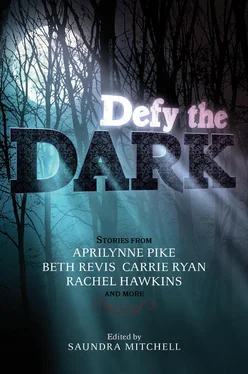Cali picked up her Outer Space crayon.
right and original—like when you’re
suffocating, burning up inside, when your
blood is
A memory floated into Cali’s mind from earlier in the night. She’d almost forgotten about the phone call. The girl. And now her phone was buzzing again, screen lit up with same area code as Eastport, but a different number. Cali answered, but there was no recording asking her to accept the charges.
“Hello. My name is Regina Simmons.”
Cali knew the woman was a social worker, probably the one who’d made the girl hang up before. It was the lilt in her voice, the strange combination of authoritarianism, compassion, and exhaustion. Cali drew another tree as she waited for Regina Simmons to continue, a sweeping trunk with feathery boughs. Some of the branches overlapped her words; she pulled out a different crayon and traced new ones over the treetops in Midnight Blue.
on fire, when your chest hurts and you
don’tcan’t
remember who you are. or if you even
exist at all. I’m
“Sorry to disturb you at this late hour. I’m a social worker for the state of Maine,” Regina Simmons went on. “I work in the Eastport Juvenile Detention Facility. I understand you may be in contact with a woman named Laura Zelnick?”
“Yes,” Cali said. Deceit was easy if you knew you wouldn’t be around when the truth came out. Cali glanced at her bookshelf, scanned the author last names until she found one she liked. “My name is Wolff. Um, Gypsy Wolff.”
sorry I lielied
about
what happened last summer. sometimes I think
maybe
“I have an unusual situation here, Gypsy,” Regina Simmons said. Papers rustled in the background, and Cali imagined the woman sitting at a big industrial-looking desk, the cheap laminate kind with metal legs like the tables and chairs at school. There was probably a cup of cold, old coffee on the desk and a picture of two little kids in a dented gold frame and maybe an award for something, if they gave awards for social work things. Cali didn’t know.
“What’s going on?” Cali asked.
“How old are you?” the woman wanted to know.
I was born in the wrong time, to the wrong
family.
And I dodid this thing, and I pretended
I’mI was
“Twenty-six,” Cali said. It felt like a good age. She’d used it before. “Just turned.”
Pen scratched paper. More shuffling. “Gypsy, do you think you can locate Laura Zelnick? Ask her to contact me at this number as soon as possible?”
“Possibly. Can I . . . May I speak with . . . the daughter again?”
“Theresa. That’s her name, the daughter.”
“I have a few questions for Theresa,” Cali said. “The answers might help me locate her mother.”
“Of course.” Regina Simmons gave Cali the number to her direct line again, made Cali promise she’d call with an update as soon as she heard from the mother. Then she was gone.
someone else, maybe.
I makemade up these stories about
The girl, Theresa, breathed into the phone. She looked different in Cali’s mind now that she had a name. Softer, somehow. Prettier. “Is your name really Gypsy?” she asked.
“No. I don’t know your mom,” Cali said. Shame crept up her neck, heat spread to her cheeks.
things. in my head, you know,
I made them up, someone from the
right time, the right place.
And for a little while, you know,
“Yeah. I know.” The girl’s voice broke again. “She left when I was . . . I don’t know. A few years ago. I don’t really remember.”
Cali nodded, even though the girl couldn’t see. The phone slipped a little, and Cali shifted it to her other ear. Her mouth opened and closed, opened and closed. Now that she had Theresa back on the line, she really didn’t know what to say, didn’t know why she was messing around with this girl and her messed-up situation.
it was almost like
they were real. But then they told me, or I don’t know,
not
them exactly, but someone
something said
“I have to go,” the girl said. “That social worker is giving me the signal.”
“Yeah?”
“It’s just that we’re not supposed to be on the office phone like this,” the girl said. “Not like this. Sorry.”
“Okay,” Cali said.
Cali, it said. Cali, it won’t last. And I knew.
But I forgot. I
forgot the parts
that happened, and the parts
that weren’t real, and
I tried
to make the rest make sense, but
Outside the window, the orb weaver worked on the next strand of her intricate web. Cali turned her paper to a clean white spot in the corner and kept scribbling as Theresa sighed into the phone, waiting like there was anything left to say.
everything
that matters matteredmatters
stopped.
And then
Cali set down her crayon. There was no more space. She couldn’t even read the last three words she’d written. She needed a new piece of paper. She slid her drawer open and shuffled through the contents with her free hand, still holding the phone with the other. She couldn’t find the rest of the paper. She went back to her letter, tried again.
“Okay. I really have to go,” Theresa said. “The social worker keeps looking at me.”
I stopped,
too. And
now
“I hope you find her,” Cali said. She wanted to add something else about the girl’s mother, but there was a murmur and muffled sounds and then the line cut out, and the phone blinked off. Cali set it on the desk. It was warm from her ear, moist from all those words and her skin and her breath. The battery icon blinked.
LOW LOW LOW.
Cali shoved the Midnight Blue crayon back into the cardboard sleeve, right between Razzle Dazzle Rose and Tickle Me Pink, and folded the yellow-and-green hood over the box.
She flicked her phone into a backspin, watched it twirl over her letter. Beneath the blur of metal and graphite, colors scrawled across the paper, trees and clouds, stars, spiderwebs. Her words had been totally enveloped. The original orangey-pink Mango Tango letters were nearly lost, peeking out now in thin fingers behind the sky, like the sky outside her window. The sun would be up soon, on the drawing and on the outside. The darkness was slipping through her fingers.
Cali slid the window sash up, then the screen. The breeze tickled her cheeks, her eyes. She shivered. The orb weaver approached the edge cautiously and tested the surface, untrusting.
Cali could close the screen. Hard. End the creature’s uncertainty, the aching and pointless need to survive. She curled her fingers over the edge, tips turning white as she held on and considered it. The spider stopped, perched on the ledge. It seemed to Cali that the creature was weighing her options. Stay, go. Hello, good-bye.
Suddenly, without warning or lead-in, pain flooded Cali’s heart. It ripped through her flesh as though she’d pressed the blade to her chest instead of her wrist, as though this bright new hurt would be the death of her now, rather than the pills rattling in the cup in the desk drawer. Her lungs filled with warm liquid, a searing, sticky feeling she didn’t recognize. Her insides burned, throat tightened. Her heart thudded and blood whooshed through veins, blue and taut beneath the scar on her wrist. Her ears rang and the room spun and she looked again at the spider, then her drawing, searching for a focal point. She found the only remaining clear words on the page and stared until they, too, swirled before her eyes, as unrecognizable in their simplicity as a foreign language.
matters
now
Cali’s cheeks were wet but the dizziness finally passed. She relaxed her fingers, slid them off the lip of the window screen, the spider still in limbo on the ledge. She’d read somewhere that nature didn’t like interruptions. Interference. But she raised the screen higher and blew a gentle breeze across the spider’s tiger belly, anyway. The sun was rising now, its bright orange fingers reaching across the sky. Cali closed her eyes and let them warm her tear-streaked face and the orb weaver scampered out over the ledge, out into the unknown.
Читать дальше












